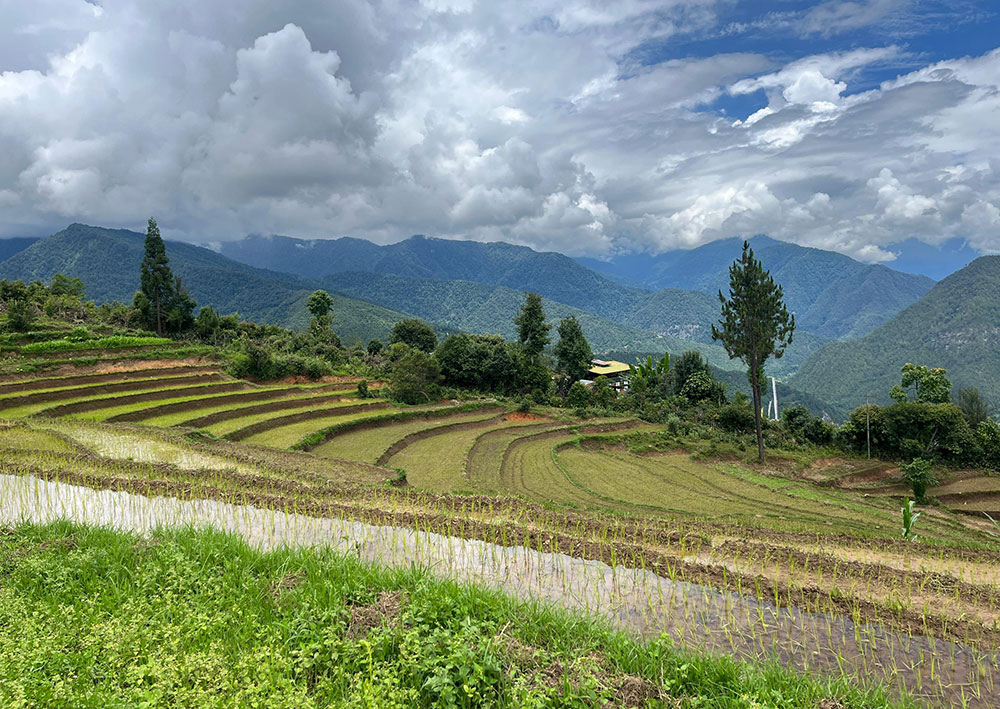Chencho Dema
Punakha—Pema Dorji, 42, is among the six organic farmers who started cultivating strawberries last year in Peythari village, Kabjisa, Punakha. This year, from March to May, he completed his first harvest and earned approximately Nu 30,000 from sales.
Pema sold his strawberries to nearby high-end hotels and at the weekend vegetable market in Kaja Throm, Khuruthang.
This success is largely attributed to the Bhutanese Knowledge for Indigenous Development (B-KIND) initiative, a project implemented in Peythari by the Tarayana Foundation in collaboration with the College of Natural Resources in Lobesa.
B-KIND aims to conduct research in various areas including climate change adaptation, sustainable organic agriculture, holistic food systems, gender transformative change, and overall well-being.
The overarching objective of the project is to co-create and apply evidence-based scientific and indigenous knowledge to promote gender-transformative practices and inform policies. It aims to enhance the adaptive capacities, sustainable livelihoods, and well-being of vulnerable rural communities in Bhutan.
Launched on August 17 last year, the project is funded by the International Development Research Centre (IDRC) with a grant of 1.2 million Canadian dollars from the Government of Canada. It is also the first IDRC-supported project in Bhutan.
The initiative aims to generate knowledge through scientific and citizen research on locally suitable organic agricultural systems, and to implement action-oriented research on best organic farming practices.
Yesterday, the High Commissioner of Canada, based in New Delhi, visited the project site. During the visit, Sonam Yuden, the village Tshogpa, highlighted the benefits that the B-KIND project has brought to the farming communities in Peythari.
Addressing the gathering, she mentioned that Peythari village, with its 44 households, primarily grows rice.
However, irrigation has been a significant challenge, especially during the paddy transplanting season.
The existing 5-kilometre irrigation channel has faced issues such as erosion and seepage.
To tackle these challenges, the project provided 400 metres of HDPE pipes and materials for constructing inlet and outlet chambers.
This intervention has reduced seepage, resulting in increased water volume and enabling successful paddy cultivation this season.
Previously barren land due to inadequate irrigation water is now actively cultivated with paddy.
In addition to supporting rice cultivation, the project has provided greenhouses to six organic farmers for vegetable production.
These greenhouses are equipped with drip irrigation systems and six sentax tanks. As a result, these farmers are now able to grow various vegetables for their own consumption.
Sonam Yuden also highlighted the success of one organic farmer who started growing strawberries in a greenhouse and began selling his produce to nearby high-end hotels, significantly boosting his income.
She said that the six organic farmers participated in a study tour to Tsirang to learn about organic farming practices. As a result, two farmers have started their own small vermicomposting trials.
Expressing gratitude, Sonam Yuden thanked the Canadian government on behalf of herself and the community for their support.
She emphasised the significant benefits derived from collaborating with researchers from Tarayana and the College of Natural Resources, enabling mutual learning.
She expressed hope for continued support to further improve the community’s livelihoods.
The six organic farmers cultivate a variety of vegetables including beans, chilies, tomatoes, eggplant, carrots, and strawberries.
With three high-end hotels nearby, they are optimistic about establishing profitable relationships and generating substantial income.


